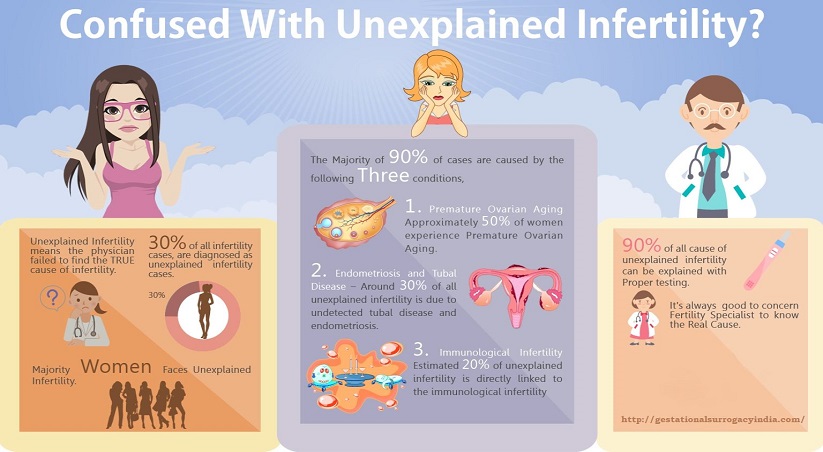The latest research shows that spouses who are of reproductive age face issues with infertility due to different causes. The number of couples facing infertility problems in India is roughly 22 to 23 million, according to the current figures. The female infertility instances comprises
for more than 40 to 50 percent of this figure, while the estimate of male infertility is 30 to 40 percent. Rates of infertility in India are on the growing due to multiple reasons associated with medicine and way of living, which sometimes deteriorate. The other potential explanations for this increase include the increased use of contraception by women who are currently in their reproductive age.
Major developments in the management and therapy of sexual conditions have taken place over the last decade. We address in this analysis the routine tests conducted to treat unexplained infertility. We will also address specific examinations, such as ovarian reserve evaluation, and the possible role of laparoscopy in the full checkup of unexplained infertility.
Finally, we review the clinical alternatives available, and address the efficiency and cost-effectiveness of current therapies. The best care plan appears to be focused on specific health variables such as gender, effectiveness of treatment, history of side-effects and expensive
models.
The annual prevalence of infertility appeared stable; however, with the increasing utilisation assisted reproductive techniques, the progress rates have risen dramatically. After their clinical assessment, approximately 15 to 30 per cent of spouses will be given a diagnosis with unexplained infertility.
Ordinarily, infertility is characterized as the failure to conceive after 1 year of continuous, unsecured intercourse. Usually, the infertility assessment is undertaken after 1 year of attempting to conceive, but in spouses of extended woman age (> 35 years) most professionals undertake clinical examination after 6 months of incapacity to conceive.
Male infertility factor is the most important reason of infertility in about 30 percent of pairs and a major contributor in another 20 percent to 30 percent. Infertile spouse diagnosis involves historical evaluation, review, and semen analysis of the male partner. Significant historical factors involve previous inheritance, a past of cryptorchidism, medical and surgical records, sexual abuse, and the use of cannabis, tobacco, alcohol, or illegal substances. Testicular irregularities such as a varicocele or absence of the vas deferens may be identified during the routine physical.
Ovulatory problems happen in 40 percent of infertile women, and in around 15 percent of pairs with infertility. Often a deficiency in ovulatory function occurs in irregular periods and can be detected through background in most people. A woman with irregular periods for root factors such as polycystic ovarian syndrome, thyroid disorder, hyperprolactinemia and hypothalamic symptoms due to weight fluctuations should be examined. Eumenorrhea-regular menstrual periods by history is a highly reliable predictor of ovulation.,
Epidemiological studies have indicated cigarette smoking, irregular body mass index ( BMI),and unnecessary intake of caffeine and alcohol decrease fertility in the female partner. To maintain a regular BMI, minimize the consumption of caffeine to not greater than 250 mg daily , and minimize alcohol consumption to not more than 4 prescribed drinks per week, the
female partner should be advised.
Before treatment of unexplained infertility is desired a comprehensive yet time-efficient
examination of the infertile pair. Spouses will perform a semen examination, ovulation monitoring, ovarian reserve evaluation, and image analysis to determine tubal and uterine variables before establishing a recommendation of unexplained infertility. You should finish this checkup within 1 menstrual period. There are different therapeutic methods accessible in spouses with unexplained infertility, which include expectant management with changing lifestyles, operative laparoscopy, COH (clomiphene citrate or gonadotropin) with IUI, and IVF (with or without ICSI).
Pune‘s finest IVF physicians are performing an effective part in assisting partners to achieve pregnancy with the aid of Pune IVF therapies. Since the introduction of Assisted Reproductive Technology (ART) treatments, spouses wishing to begin their families in the coming years have become simpler to handle since infertility issues. Some well-established
Orion IVF Clinic in Pune delivers such ART processes, which are renowned in aspects of their facilities, IVF achievement rates, reasonable rates, doctor’s credentials and IVF professional expertise.

